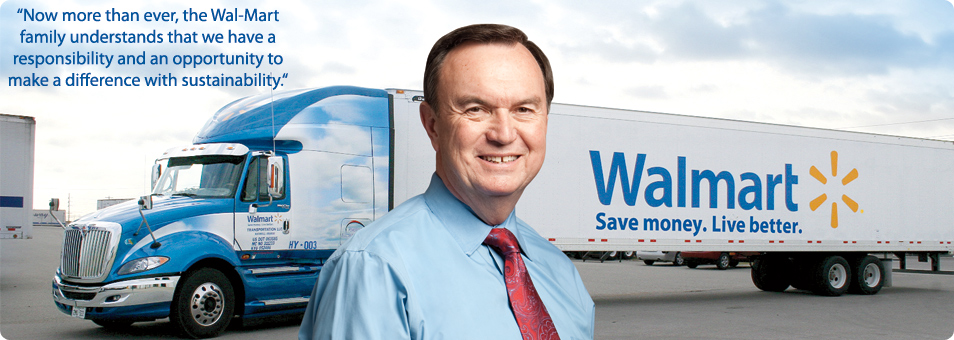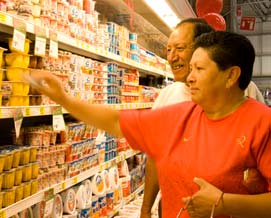
A Message From Mike Duke
As you'll see in this Report, Wal-Mart continues to make real and measurable progress toward becoming a more sustainable company. We've moved closer to the three core goals we set in October 2005: to be supplied 100 percent by renewable energy; to create zero waste; and to sell products that sustain our resources and the environment. At the same time, we've also made additional commitments and progress in social areas, such as diversity, health care and responsible sourcing.
"Sustainability 360" is what we call the approach that has guided the expansion of our efforts. It's a company-wide emphasis on integrating sustainability into our business by engaging Wal-Mart's associates, suppliers, communities and customers. Together, our goal is to make an even bigger difference in people's lives, in our businesses, and in the communities that we touch around the world. Now more than ever, the Wal-Mart family understands that we have a responsibility and an opportunity to make a difference with sustainability.
Last year brought one of the most challenging global economies in decades. Every dollar, pound, peso and yuan matters to the working families who are our customers around the world. These difficult economic times have led to an obvious question that a number of people have asked me: "Can Wal-Mart afford to continue to be so aggressive in sustainability?" My response has been very clear and direct: "We can't afford not to. We need to accelerate and broaden our efforts."
In the months, quarters and years ahead, we won't just build on the foundation that we've laid over the last four years. By "accelerate," I mean that we'll move quicker and with a sense of urgency. By "broaden," I mean that the entire Wal-Mart family will participate. I'm fully committed to sustainability in my new role and expect every member of the Wal-Mart family around the world to share that same enthusiasm.
Making Sustainability Sustainable
I believe we're on our way to achieving our goal of making sustainability sustainable at Wal-Mart. We've said many times before that our Company would remain committed to sustainability during the good times and the tough times. There's no question that the tough times are here. And there's no question that almost every company, including Wal-Mart, is looking to reduce costs. But what you'll see in this Report is that we're not scaling back or even just staying the course in sustainability. We're expanding our efforts around the world.

How are we able to do this? We owe so much gratitude to Lee Scott for his leadership of our business, especially in the area of sustainability. One of the things that he taught me about Wal-Mart and sustainability is that it really comes down to who we are, how we work, and what we stand for as a company.
The fact is sustainability at Wal-Mart isn't a stand-alone issue that's separate from or unrelated to our business. It's not an abstract or philanthropic program. We don't even see it as corporate social responsibility. Sustainability is built into our business. It's completely aligned with our model, our mission and our culture. Simply put, sustainability is built into our business because it's so good for our business.
Sustainability helps us deliver on our Every Day Low Price business model. Using more renewable energy, reducing waste and selling sustainable products helps us take costs out of the system. This year, for instance, we surpassed our goal of achieving 25 percent greater fleet efficiency. The savings from this and other sustainability initiatives translate into lower costs and low prices for our customers.
At Wal-Mart, we "save people money so they can live better." Sustainability is a great example of how we fulfill this mission. It used to be that sustainable products were out of reach for working men and women. But Wal-Mart simply does not believe that customers should have to choose between sustainable products and products they can afford. Whether it's compact flourescent light bulbs (CFLs) or organic milk, we've helped make sustainability affordable and accessible to our customers and members.

Caring About Our Communities
Sustainability also fits with the values and culture that define our Company. I believe a lot in performance, but I also believe in caring about people and contributing to communities. Last year, Wal-Mart and its Foundation donated $378 million in cash and in-kind contributions to charities across the U.S., which is a more than 27 percent increase over the previous year. And we donated more than $45 million in other markets around the world. I'm also proud that our U.S. associates last year donated more than 1 million hours to charitable organizations. Sustainability, in the words of Sam Walton, has really helped "our people make the difference" in their own lives and in their communities.
When we set out to become a more sustainable company, we did a lot of listening. And we continue to talk with community leaders, elected officials, academic experts, supplier executives, and social and environmental non-governmental organizations. We're grateful for the roles they've all played in helping us become a better company. And we'll work hard to continue to broaden and deepen those relationships.
When we produced our first Report in 2007, we received some excellent and very candid feedback about our progress and potential. We will, of course, welcome comments and constructive criticism about this Report, as well. One improvement we've made is to provide more data, metrics and results.
As an engineer, I love that we've done this, but I also recognize that we have more work to do to track progress toward our goals, especially in our buildings and packaging efforts. We've also captured in this Report, I believe, a fuller picture of our sustainability efforts to date. Let me share with you some of the specific highlights.
Through investments in solar and wind energy in Mexico, Canada and the U.S., we're making progress toward being supplied 100 percent by renewable energy. You'll see in this Report, for example, that we've made a commitment to purchase wind power equal to 15 percent of our total energy load in deregulated markets in Texas.
Meaningful Strides to Create Zero Waste
We're also making strides towards our goal to create zero waste. As we learned in 2007, measuring waste is challenging because our Company simply has not historically measured the amount of waste it sends to landfills. Last year, however, we made progress in this area and now have a solid baseline — with more than 57 percent of the waste generated by our stores, clubs and distribution centers being redirected from landfills.

And whether it's CFLs in China or organic produce in Brazil, we're putting on our shelves even more products that sustain our resources and the environment. Our decision to sell only concentrated liquid laundry detergent in our U.S. stores is making a difference.
In this Report, you'll also see a broader discussion of social initiatives. For instance, we recently launched a project that will reduce Puerto Rico's dependence on imported produce, create new jobs and economic growth, and provide Wal-Mart customers with even fresher and lower-cost fruits and vegetables. We're launching local agricultural programs like this all around the world, including our Direct Farm Program, which will involve as many as 1 million farmers in China by 2011.
Sustainability Summit Ushers in New Era
At our Beijing Sustainability Summit in October, we made it clear that we expect suppliers — whether in China, Costa Rica or the U.S. — to continue to comply with ethical standards and environmental laws. These efforts will improve the lives of the workers in our supplier factories. Those workers will also have more environmentally responsible businesses in their communities. And as for our customers, they can be proud of shopping at Wal-Mart, where the corporation is committed to doing what's right and to providing products that meet their expectations for quality.
You will see that we have very specific metrics tables in each of the social areas. This Report shows, for example, that Wal-Mart made $789 million in 401(k) and profit-sharing contributions to hourly associates in the U.S. in 2008. And that's in addition to the $934 million in bonuses that we distributed to hourly associates in the U.S. This Report also shows that we have made progress on diversity by growing our overall female associate base. We continue to increase the number of women and minorities in our workforce, including those in management positions.
In the coming year, you'll also see us put more focus on associate opportunity. Even in a tough economy, as many companies reduced their workforces, we created tens of thousands of jobs around the world last year and plan to do so again this year. These are good jobs that offer competitive wages and good benefits. Thanks to improvements in our health insurance offerings, for example, we've had a 7.3 percent enrollment increase over the last five years. Today, nearly 95 percent of Walmart U.S. associates have some form of health care coverage. We want to make sure that we give our associates the pay, benefits and opportunities they need to make a career at Wal-Mart.
In my new role, my focus in the months ahead will be on ensuring continuity in our strategy and building even more momentum in our business. This applies to our Company in every way and all around the world. Therefore, it also applies to our efforts in sustainability. At Wal-Mart, we do not — and I will not — separate our business from our responsibility and opportunity to be a more sustainable company.
Sustainability: Broaden and Accelerate
As I mentioned earlier, we'll broaden our commitment to sustainability. Geographically, every associate, every store and every supplier will be expected to contribute. No area of our Company will fail to find some way to help make Wal-Mart more sustainable. You'll also see us contribute to public discussions and debates on the environment — whether it's in the U.S. Congress or at the United Nations Climate Change Conference in Copenhagen.
When it comes to accelerating our commitment, one of the reasons I got into retailing was because of its quick pace. My goal is that when we look back in a quarter, in a year, or in five years, we're once again surprised by how far and fast we've gone. We all need to have a sense of urgency. We all need to apply our full effectiveness to these efforts. If we do, I know we'll be proud of the difference that the Wal-Mart family makes in the world.

Michael T. Duke
President and Chief Executive Officer
Wal-Mart Stores, Inc.




